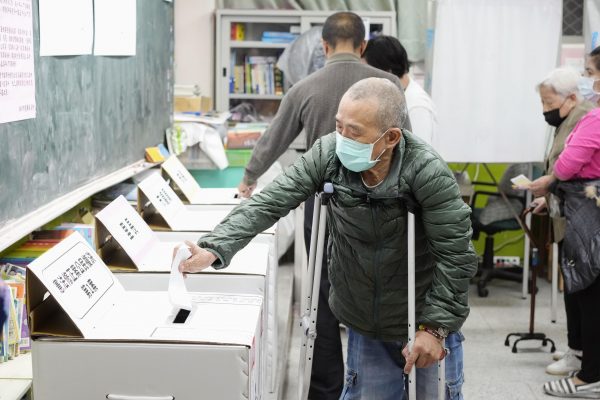The Taiwan People’s Party (TPP), a small opposition party with indirect political support from the KMT, won its first mayoral position in Hsinchu city. Chung Tung-chin, elected as mayor of Miaoli County, also has KMT party membership. Taking Hsinchu city and Miaoli County into account, the KMT will directly or indirectly control the governance of 15 Taiwanese cities. All told, the election was an overwhelming victory for the KMT.
Taiwan does not have exit polls that could inform analysis of voting behaviour. But it is likely that poor governance, economic crisis during the COVID-19 pandemic and the failure to motivate young supporters to vote were critical factors behind the DPP’s election losses.
Taiwan managed the pandemic successfully in 2020–2021 when there was only a limited number of confirmed cases. But President Tsai Ing-wen’s government had difficulties obtaining adequate COVID-19 vaccines due to the political boycott from the Chinese Communist Party (CCP) and the domestic political competition between the DPP and KMT. As the number of confirmed cases increased, many Facebook users expressed their discontent and left angry messages on the Ministry of Health and Welfare webpage.
Taiwan’s high inflation was another critical issue. Average food inflation between January and June 2022 reached a peak of 5.83 per cent, much higher than Taiwan’s major East Asian counterparts Japan, South Korea, Singapore, Thailand and Hong Kong. In June 2022 President Tsai Ing-wen’s disapproval rating surpassed even her earlier approval rating upon taking office for her second term in May 2020.
The DPP’s loss of support in the election was reflected in the low turnout rate, particularly among the younger generations. The turnout rate in the election was only 59.86 per cent, the lowest figure since 2008. The DPP has the highest support of any major political party among under 40s at about 30 per cent. The failure to motivate these young supporters to go to vote was an important reason behind the DPP’s loss. The defeat of the recent constitutional referendum to lower the voting age to 18 years old was a further reflection of the DPP’s declining support among young voters. Re-motivating young supporters will be one of the critical challenges for the DPP in the upcoming 2024 national elections.
Many observers have argued that although anti-China sentiment has frequently been used by the DPP and the more pro-independence ‘pan-Green’ parties to elicit support, the DPP failed to capitalise on anti-China sentiment this election. But while anti-China sentiment has been critical to winning political positions at the national level, foreign policy is not a key factor in local elections.
This is not to say that the China factor is no longer essential or that attitudes toward China have changed. Cross-Strait relations are an important issue in national elections every four years. The KMT tends to emphasise the so-called ‘1992 Consensus’, while the DPP stresses a sense of ‘national subjugation’ (wáng guógǎn). Both the KMT and the DPP like to use cross-Strait and regional issues, such as Taiwan–US–China relations, in national-level elections to gain voters’ support and cast doubts on their competitors’ loyalty to the country and attitudes toward China.
In a poll taken after the CCP government began to increased military pressure on Taiwan by sending military aircraft and naval ships around the island, 73 per cent of respondents indicated that they could not accept the CCP’s provocative military behaviour and expected a tough response from the Tsai administration.
The China factor and cross-Strait relations will be critical in the 2024 presidential and the national elections. The KMT may use the ‘local compassing central’ (dì fāng bāo wéi zhōng yang) strategy to ask local mayors to put greater pressure on Tsai’s government to accept the 1992 Consensus or modify her current policy toward China.
One KMT politician — Chen Yu-Jen from the island of Kinmen — has already done so. On 13 December, Chen visited mainland China to negotiate trade between mainland China and Kinmen without the central government’s authorisation. After the visit, Chen argued that she will put more pressure on the Tsai government to ease political tension across the Taiwan Strait and re-implement the policy of ‘mini-three-links transportation’.
Clearly, the failure of the DPP in the election and pressure from KMT politicians eager to improve relations between Taiwan and mainland China may have political implications for Taiwan and Taiwan–US–China relations going forward.
Hsien-Ming Lin is Assistant Professor at the Department of Public Administration, National Open University, Taiwan.

